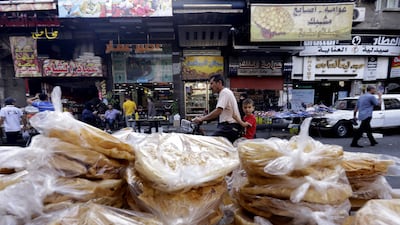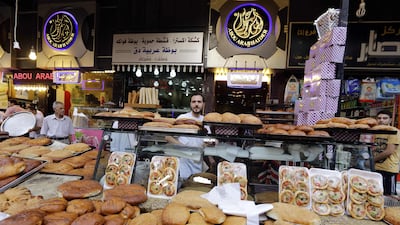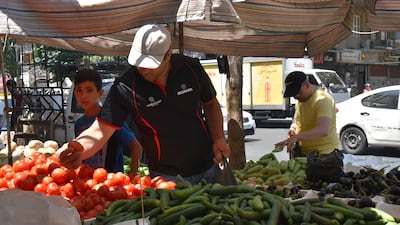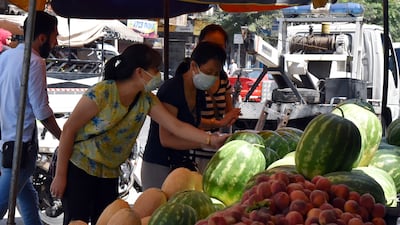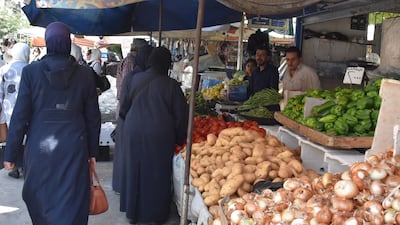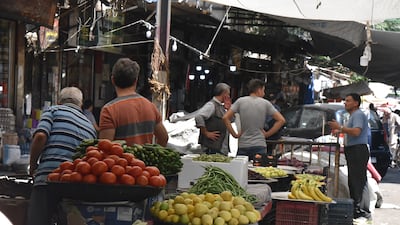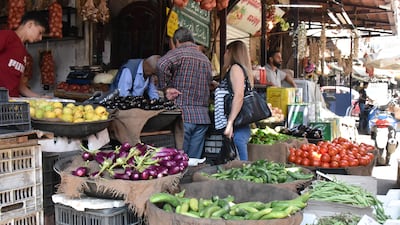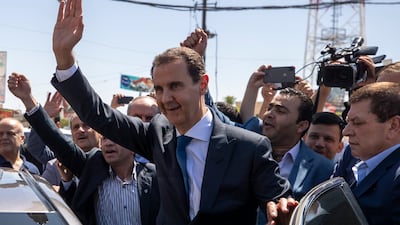Days before the anti-regime protests that sparked Syria’s civil war broke out in the country’s south in March 2011, President Bashar Al Assad drove to the region unannounced.
He visited several towns and villages in what state media described as a gesture of concern about living conditions, which had worsened as a result of soaring prices and bad harvests. But the president toured only Christian and Druze areas.
The demonstrations started in Deraa, the main city in the province of the same name and the region’s urban and farming centre, dominated by Syria’s Sunni majority.
Although the protests spread to parts of neighbouring Suweida, a mostly Druze province, the regime suppressed these in less violent and punitive ways than it had in Deraa.
But new protests in Suweida this week, and signs of discontent in the heartland of Mr Assad’s Alawite sect, indicate that his regime’s policy of co-opting minorities may have reached its limits in the face of a severe economic decline after more than a decade of conflict.
Plans for widespread reconstruction of war-damaged areas remain on paper, although the UN has poured billions of dollars into regime areas in recent years to restore schools, clinics, sanitation and even markets, as well as for technical training for government personnel.
Perks and concessions
Alone among Syria’s minority groups, the Druze of Suweida have a de facto waiver of mandatory military conscription. The regime has not punished young Druze men who failed to sign up, nor does it force boys of conscription age to do so.
It is a significant reprieve for the tiny community, which comprised about 3 per cent of Syria’s 20 million population in 2010, the last year reliable statistics were available.
But thousands of young Druze have joined militias the regime began to create in Suweida in 2012. The regime portrayed these forces as bulwark against Sunnis in Deraa – with whom there are historic and violent disputes over land – but they also serve as a counter to anti-regime Druze clans who have quietly armed themselves.
Other regime incentives for loyalty, such as pay rises, have become less valuable than before because of soaring inflation. And no one is spared the severe shortages of electricity and fuel.
Residents of the province said groups of mostly young people took to the streets for a fifth day on Thursday to complain about poverty and corruption, although their numbers dropped sharply with an increased presence of state security.
Local officials “sent messages reminding Suweida that we already don’t serve in the army and that we practically have self-administration”, said a resident who asked not to be identified.
“The society in Suweida is finely balanced and the regime knows how to play on this,” he said.
Similar demonstrations occurred in the region last year after another sharp drop in the value of the Syrian pound. Security forces arrested about 20 young people, most of whom were released.
Syria's food crisis deepens as bread prices double - in pictures
Core loyalists
In a veiled reference to Suweida, Bouthaina Shaaban, an adviser to the president, wrote in the loyalist Al-Watan newspaper this week that street protests were intended to destabilise Syria and “had nothing to do with improving living conditions”.
In reference to Islamist militancy, she warned of a “fifth column” aiming to undermine the fight against “the mightiest terrorist forces in the world”.
Even before the civil war, the regime portrayed itself as a bulwark against Sunni extremist groups such as Al Qaeda. The rise of ISIS helped it drive home the message, particularly among Syria’s minority communities.
But the regime’s crushing of the armed Sunni opposition in the civil war, with help from Iran and Russia, has undermined its arguments because the supposed enemy has been all but wiped out, said Jihad Yazigi, the editor of Syria Report, an economic and business newsletter based in Beirut.
“The Sunnis are traumatised by the regime and know that the regime can do what it wants with them if they protest again,” he said.
He said the waning of the perceived Sunni threat had turned the focus to the economy, but Mr Assad “continues to show total lack of interest in reviving it”.
Street protests like those in Suweida would be politically significant only if they spread to Alawite regions, Mr Yazigi said.
“The regime still has the money to satisfy its core loyalist fighting units,” he said.
This core continues to be drawn from the Alawite heartland on the Mediterranean coast.
In the past few weeks there has been rare public defiance of Mr Assad among the Alawite community.
In the Ismaili and Alawite town of Masyaf, a mob ransacked a communications centre belonging to an internet company linked to the president’s wife. An Alawite journalist in the coastal province of Tartus, Kenan Wakkaf, mocked Mr Assad on Facebook for ignoring mass discontent over the economy, and has since gone into hiding.
Fragility under the surface
When Mr Assad drove to the south in 2011, with his wife, Asma, in the passenger seat, the Syrian pound was trading at 50 to the dollar.
Syria’s per capita income was $2,500, on par with Egypt. The state made several billion dollars a year from selling oil and there was some foreign investment, mostly in property.
The Syrian pound now trades at about 3,500 to the dollar and most of the country’s oilfields are with Kurdish militia. The latest World Bank data shows per capita income at $1,334 in 2019.
A senior European diplomat said Mr Assad may be ignoring the economy because “hard power repression is still stronger than the popular resentment, grievances, frustrations and protest”.
“He is leaving leeway on Suweida because it is a minority community. But the economy is getting so much worse,” the diplomat said.
“It is a very fragile peace. We cannot exclude that at some point it might implode.”
The White Lotus: Season three
Creator: Mike White
Starring: Walton Goggins, Jason Isaacs, Natasha Rothwell
Rating: 4.5/5
The specs
Engine: 2.0-litre 4cyl turbo
Power: 261hp at 5,500rpm
Torque: 405Nm at 1,750-3,500rpm
Transmission: 9-speed auto
Fuel consumption: 6.9L/100km
On sale: Now
Price: From Dh117,059
Crazy Rich Asians
Director: Jon M Chu
Starring: Constance Wu, Henry Golding, Michelle Yeon, Gemma Chan
Four stars
PSG's line up
GK: Alphonse Areola (youth academy)
Defence - RB: Dani Alves (free transfer); CB: Marquinhos (€31.4 million); CB: Thiago Silva (€42m); LB: Layvin Kurzawa (€23m)
Midfield - Angel di Maria (€47m); Adrien Rabiot (youth academy); Marco Verratti (€12m)
Forwards - Neymar (€222m); Edinson Cavani (€63m); Kylian Mbappe (initial: loan; to buy: €180m)
Total cost: €440.4m (€620.4m if Mbappe makes permanent move)
GOLF’S RAHMBO
- 5 wins in 22 months as pro
- Three wins in past 10 starts
- 45 pro starts worldwide: 5 wins, 17 top 5s
- Ranked 551th in world on debut, now No 4 (was No 2 earlier this year)
- 5th player in last 30 years to win 3 European Tour and 2 PGA Tour titles before age 24 (Woods, Garcia, McIlroy, Spieth)
Ruwais timeline
1971 Abu Dhabi National Oil Company established
1980 Ruwais Housing Complex built, located 10 kilometres away from industrial plants
1982 120,000 bpd capacity Ruwais refinery complex officially inaugurated by the founder of the UAE Sheikh Zayed
1984 Second phase of Ruwais Housing Complex built. Today the 7,000-unit complex houses some 24,000 people.
1985 The refinery is expanded with the commissioning of a 27,000 b/d hydro cracker complex
2009 Plans announced to build $1.2 billion fertilizer plant in Ruwais, producing urea
2010 Adnoc awards $10bn contracts for expansion of Ruwais refinery, to double capacity from 415,000 bpd
2014 Ruwais 261-outlet shopping mall opens
2014 Production starts at newly expanded Ruwais refinery, providing jet fuel and diesel and allowing the UAE to be self-sufficient for petrol supplies
2014 Etihad Rail begins transportation of sulphur from Shah and Habshan to Ruwais for export
2017 Aldar Academies to operate Adnoc’s schools including in Ruwais from September. Eight schools operate in total within the housing complex.
2018 Adnoc announces plans to invest $3.1 billion on upgrading its Ruwais refinery
2018 NMC Healthcare selected to manage operations of Ruwais Hospital
2018 Adnoc announces new downstream strategy at event in Abu Dhabi on May 13
Source: The National
UAE currency: the story behind the money in your pockets
Things Heard & Seen
Directed by: Shari Springer Berman, Robert Pulcini
Starring: Amanda Seyfried, James Norton
2/5
Farage on Muslim Brotherhood
Nigel Farage told Reform's annual conference that the party will proscribe the Muslim Brotherhood if he becomes Prime Minister.
"We will stop dangerous organisations with links to terrorism operating in our country," he said. "Quite why we've been so gutless about this – both Labour and Conservative – I don't know.
“All across the Middle East, countries have banned and proscribed the Muslim Brotherhood as a dangerous organisation. We will do the very same.”
It is 10 years since a ground-breaking report into the Muslim Brotherhood by Sir John Jenkins.
Among the former diplomat's findings was an assessment that “the use of extreme violence in the pursuit of the perfect Islamic society” has “never been institutionally disowned” by the movement.
The prime minister at the time, David Cameron, who commissioned the report, said membership or association with the Muslim Brotherhood was a "possible indicator of extremism" but it would not be banned.
MATCH INFO
France 3
Umtiti (8'), Griezmann (29' pen), Dembele (63')
Italy 1
Bonucci (36')
Iraq negotiating over Iran sanctions impact
- US sanctions on Iran’s energy industry and exports took effect on Monday, November 5.
- Washington issued formal waivers to eight buyers of Iranian oil, allowing them to continue limited imports. Iraq did not receive a waiver.
- Iraq’s government is cooperating with the US to contain Iranian influence in the country, and increased Iraqi oil production is helping to make up for Iranian crude that sanctions are blocking from markets, US officials say.
- Iraq, the second-biggest producer in the Organization of Petroleum Exporting Countries, pumped last month at a record 4.78 million barrels a day, former Oil Minister Jabbar Al-Luaibi said on Oct. 20. Iraq exported 3.83 million barrels a day last month, according to tanker tracking and data from port agents.
- Iraq has been working to restore production at its northern Kirkuk oil field. Kirkuk could add 200,000 barrels a day of oil to Iraq’s total output, Hook said.
- The country stopped trucking Kirkuk oil to Iran about three weeks ago, in line with U.S. sanctions, according to four people with knowledge of the matter who asked not to be identified because they aren’t allowed to speak to media.
- Oil exports from Iran, OPEC’s third-largest supplier, have slumped since President Donald Trump announced in May that he’d reimpose sanctions. Iran shipped about 1.76 million barrels a day in October out of 3.42 million in total production, data compiled by Bloomberg show.
- Benchmark Brent crude fell 47 cents to $72.70 a barrel in London trading at 7:26 a.m. local time. U.S. West Texas Intermediate was 25 cents lower at $62.85 a barrel in New York. WTI held near the lowest level in seven months as concerns of a tightening market eased after the U.S. granted its waivers to buyers of Iranian crude.
The%20specs
%3Cp%3E%3Cstrong%3EEngine%3A%3C%2Fstrong%3E%202-litre%204-cylinder%3Cbr%3E%3Cstrong%3EPower%3A%20%3C%2Fstrong%3E153hp%20at%206%2C000rpm%3Cbr%3E%3Cstrong%3ETorque%3A%20%3C%2Fstrong%3E200Nm%20at%204%2C000rpm%3Cbr%3E%3Cstrong%3ETransmission%3A%20%3C%2Fstrong%3E6-speed%20auto%3Cbr%3E%3Cstrong%3EFuel%20consumption%3A%20%3C%2Fstrong%3E6.3L%2F100km%3Cbr%3E%3Cstrong%3EPrice%3A%20%3C%2Fstrong%3EDh106%2C900%3Cbr%3E%3Cstrong%3EOn%20sale%3A%20%3C%2Fstrong%3Enow%3C%2Fp%3E%0A
Our legal consultant
Name: Hassan Mohsen Elhais
Position: legal consultant with Al Rowaad Advocates and Legal Consultants.
Teri%20Baaton%20Mein%20Aisa%20Uljha%20Jiya
%3Cp%3E%3Cstrong%3EDirectors%3A%3C%2Fstrong%3E%20Amit%20Joshi%20and%20Aradhana%20Sah%3C%2Fp%3E%0A%3Cp%3E%3Cstrong%3ECast%3A%3C%2Fstrong%3E%20Shahid%20Kapoor%2C%20Kriti%20Sanon%2C%20Dharmendra%2C%20Dimple%20Kapadia%2C%20Rakesh%20Bedi%3C%2Fp%3E%0A%3Cp%3E%3Cstrong%3ERating%3A%3C%2Fstrong%3E%204%2F5%3C%2Fp%3E%0A

